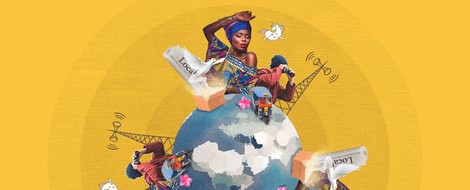Your podcast discovery platform
Curious minds select the most fascinating podcasts from around the world. Discover hand-piqd audio recommendations on your favorite topics.

piqer for: Boom and bust Global finds
I am a Dutch journalist, writer and photographer and cover topics such as human rights, poverty, migration, environmental issues, culture and business. I’m currently based in The Hague, The Netherlands, and frequently travel to other parts of the world. I have also lived in Tunisia, Egypt, Kuwait and Dubai.
My work has been published by Al Jazeera English, BBC, The Atlantic's CityLab, Vice, Deutsche Welle, Middle East Eye, The Sydney Morning Herald, and many Dutch and Belgian publications.
I hold an MA in Arabic Languages and Cultures from Radboud University Nijmegen and a post-Master degree in Journalism from Erasmus University Rotterdam. What I love most about my work is the opportunities I get to ask loads of questions. Email: [email protected]
Karl Sharro’s Middle East Satire: "I Don’t Have To Make Things Up"
Karl Sharro is an architect, satirist and Middle East commentator who was born in Lebanon. In this seminar for the Middle East Studies Centre in the University of Oxford, he speaks about his satire since the Arab uprisings.
We started to get these kinds of headlines: Is the Arab world ready for democracy? Why Western democracy can never work in the Middle East.
He talks about his cartoons and maps, such as ‘Six ways to divide the Middle East and North Africa’ and ‘Our bold proposal to reshape Western Europe for a more stable and peaceful future (inspired by what Europe did elsewhere)’.
I don’t have to make things up. I just have to rearrange things on a page and press publish.
He also created: ‘Tears will fall (in Arabia) (because of the tear gas). A more realistic James Bond movie’, in which Bond is asked to deliver a shipment of tear gas to Bahrain.
He reads a few of his articles, such as ‘Reporting from Syria "with sensational quotes in the headline’’', an imaginary article from this series by Robert Fisk in The Independent. Sharro starts explaining he has nothing against journalists but is annoyed by the elder, complacent and lazy ones.
The raven sipped his black tea, sweetened with spoonfuls of the local cane sugar that was first processed when the Persians ruled this part of the Fertile Crescent, then looked at me with his piercing eyes that looked more menacing above his long beak. ‘Ask for Abu Mohomed, he will talk to you.’ He said Mohamed, but I have this habit of misspelling Arab names. When I left, the raven had disappeared. If it weren’t for the black feather on the floor, I would have thought he was a mirage.
His article 'An Adoring Profile of a Western Journalist' is hilarious too:
His notebook which he throws casually on the table looks like it was hand-made by elves for a king, all leather-bound and important looking. We’re taking notes on cheap school notebooks with Bic pens. No wonder nobody takes us seriously us non-Western journalists.
